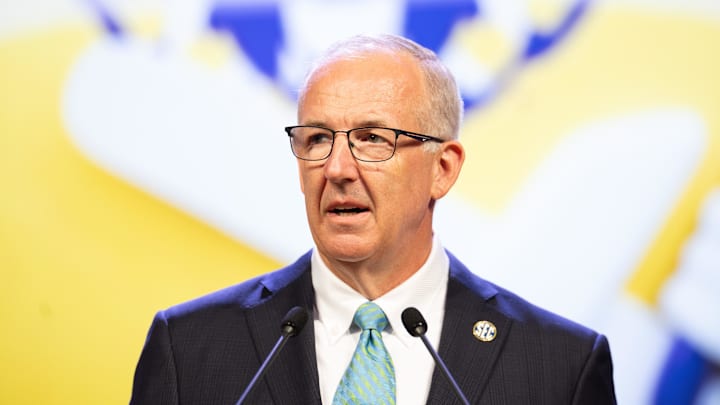SEC Media Days have begun in Dallas, Texas, away from their normal stomping grounds in Alabama or Atlanta. They are celebrating the arrival of two new member institutions, Oklahoma and Texas.
This has been a long time coming. We first heard about the plans for this move three years ago.
The SEC’s addition of the Sooners and Longhorns triggered a wave of conference realignment, followed by USC and UCLA to the Big Ten and the dissolution of the PAC-12 Conference as we know it.
The only conference untouched (so far) has been the Atlantic Coast Conference, due to the long-term Grant of Rights. Nonetheless, Clemson and Florida State are challenging that contract in court.
Most observers agree that the legal proceedings are nowhere close to being concluded, but that the exit of the two schools (and maybe more) could be inevitable.
Since the SEC is one of the possible destinations for the Tigers and the Seminoles, commissioner Greg Sankey was asked this week whether he has been in contact with any prospective members.
"I'm not a recruiter. My job is to make sure we meet the standard of excellence that we have for ourselves on a daily basis. That attracts interest. It's done that with the two universities that we have added this year. They're not the only phone calls I've ever had, but I'm not involved in recruitment. Our presidents have been clear that I am not going to entangle us in litigation around expansion. So I pay attention, but I'm not engaged in those conversations. The broader implications, obviously if things change, then there's a new level of uncertainty. It already creates speculation that I think is counterproductive, but I don't spend an enormous amount of my time thinking about it. I certainly don't spend any time engaged in that recruiting activity because we're focused on our 16."Greg Sankey
One does not rise to the station of SEC Commissioner without learning how to dance around a question that he would prefer not to answer. We can glean a couple of things from this statement, however.
The first point should be obvious to most, but often gets overlooked by fans: the SEC doesn’t need to expand. Neither does the Big Ten.
Needs and wants are two different things. Both conferences might want to add schools from the ACC, but right now both carry baggage. The last thing the Power Two want is for that baggage to entangle them in lawsuits as well.
There has been speculation that one or both schools in question could declare their intention to leave the ACC after the 2024-25 calendar. That might still occur if they feel confident about the direction of their cases.
The schools might be willing to make that jump while legalities continue, but it doesn’t sound like the SEC is willing to do that, and my guess is that the Big Ten isn’t either.
Sankey is correct – the SEC sells itself. Right now, he doesn’t need to be a recruiter. That makes it a good way to frame his answer. His answer does give away one thing, however: the SEC is positioning themselves to be able to recruit should the circumstances make it possible.
That doesn’t necessarily mean Clemson or Florida State would be the targets. Other schools such as North Carolina and Virginia hold value for the Power Two as well, perhaps more due to reasons I reviewed recently.
Sankey once again showed why he has his job: he made it clear that the SEC won’t be a part of any entanglements on behalf of any schools while also being careful to not close any doors that the league might want to open in the future.
